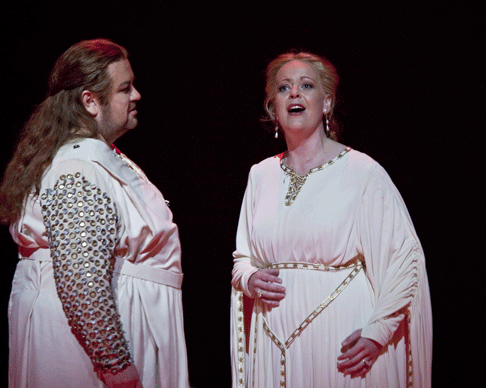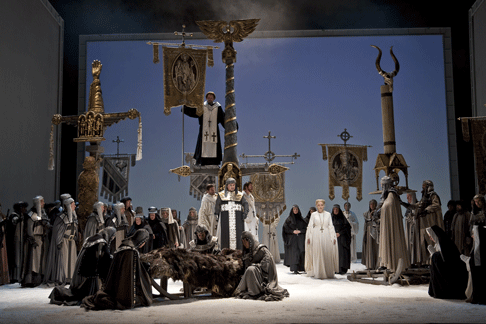There were a lot of first-night nerves around, unsurprisingly given that King Heinrich, Telramund, Elsa and the Herald were all house debutants, but they all showed great star quality to match that of the more experienced Ortrud and Lohengrin. Semyon Bychkov elicited some of the most polished and exquisite playing from the ROH orchestra that I have heard in a long time; overall this was a wonderful evening, a shining example of what the Royal Opera House is all about.
The shimmering strings of the overture, so delicately shaped and daringly leisured in tempo, were somewhat compromised for many in the audience by the noisy actions of some latecomers, but the conductor sailed on as if surrounded by total silence. An aside, but what can be done about the appalling manners of some of the (supposedly) ‘great and good?’ It wasn’t just the noise—just to add insult to injury, as Lohengrin launched into ‘In fernen Land’ a man leaned over his wife to ask their friend, not exactly sotto voce, ‘So, where shall we eat after the show, then?’ Presumably these were amongst those like the bejewelled crinkly lady whom I heard complain loudly that she ‘got offered so many free tickets here that I just can’t fit it all in.’
The production is now 32 years old, yet it still looks fresh and logical for the work, with those prostrate nuns and gilt-encrusted icons reminiscent not so much of tenth century Brabant but ‘Old Mother Russia,’ and the muted colour tones of white and grey subtly contrasted with the splashes of red and gold. Some might consider the presentation of the swan as a projected motif underwhelming, but to me it was just right, with the Knight’s entrance via the trapdoor still producing a frisson—and let’s face it, this solution avoids any possibility of having to enquire ‘Wann f‰hrt der n‰chste Schwann?’
More than any other of Wagner’s operas, ‘Lohengrin’ is all about the singing, and here this production excels. Johan Botha does not possess the ideally heroic stage presence for the title part, nor would he be accurately described as a Heldentenor, yet his singing is always expressive, finely phrased and sensitively shaped. Lohengrin is a rarity amongst Wagner’s major tenor roles in that his music is far more often marked to be sung mezzo-forte rather than forte, and Botha offers a hero more in the lyrical mould of a Slezak than a belter, and his characterization is all the better for it. ‘Mein Lieber Schwann’ was achingly poignant, reminding me of Rosvaenge’s recording of it, and ‘In fernen Land’ was as affecting as it should be, the gentle pressure on ‘Taube’ and the heroic strength of ‘Sein Ritter ich’ parts of a seamlessly dramatic whole.
 Johan Botha as Lohengrin and Edith Haller as Elsa
Johan Botha as Lohengrin and Edith Haller as Elsa
His Elsa was the beautiful South-Tyrol soprano Edith Haller, in a house debut performance which revealed a sweet, bell-like purity of tone, with the capacity to melt one’s heart in phrases like ‘Es gibt ein Gl¸ck, das ohne Reu’—‘Einsam in tr¸ben Tagen’ was also a model of clarity and touching sweetness. At present, however, her voice is ‘merely’ lovely and crystalline, lacking in some colour and variety, and she found the last act a challenge in parts. Nevertheless, a notable debut from a soprano whom we will look forward to hearing in many other rÙles.
Petra Lang’s Ortrud is a known quantity, yet she never ceases to surprise with the vehemence and commitment of her acting and the commanding quality of her singing. You half expect her to utter remarks like ‘Come, you spirits that tend on mortal thoughts. Unsex me here!’ as she launches into one of her tirades, and I can’t recall having experienced quite so marked a shiver down the spine by anyone else’s singing of the phrase ‘der Rache s¸sse Wonne’ or quite so definite a frisson during her ‘Entweitert Gˆtter.’ Her husband was the fascinating baritone Gerd Grochowski, who looks a bit too noble for the weak Telramund, but whose singing, firmly in the Fischer-Dieskau mould, was supple and expressive. Indeed, there were times when one felt more sympathy for him than one probably should.
 Scene from Lohengrin
Scene from Lohengrin
Two more house debutants gave impressive performances of the rÙles of Heinrich I and the Herald. This was the first time I’ve heard the Korean bass Kwangchul Youn, whose sound may lack a little in volume but whose expressiveness and dignity were a joy—he may have missed a little of the king’s grandeur here and there, but he more than made up for it with the Prayer, with genuinely noble heft at ‘weil unsere Weisheit Einfalt ist.’ I look forward to hearing his Commendatore and MÈphistophÈlËs. Boaz Daniel’s Herald was another noble assumption, his proclamations of ‘Nun hˆret Mich’ true clarion calls.
The Chorus sounded a little underpowered at the beginning, but rose to great heights at ‘Wie fasst uns selig s¸sses Grauen!’ and ‘Wir steh’n zu dir.’ They were matched by orchestral playing of real majesty, the strings and trumpets especially covering themselves in glory. It’s now three years since Semyon Bychkov conducted here, and I hope it won’t be that long again before we experience his blend of absolute control and sympathetic support for singers.
A great evening—and mercifully delivered uncut, with further performances on May 3rd (matinee), 5th, 8th, 11th, 14th and 16th. It is an almost full house for each night, but there are a sprinkling of seats to be had as well as Day tickets—if you haven’t booked yet, you are strongly advised to do so now, to experience a ‘Lohengrin’ which comes as near to expressing what Wagner called ‘one of man’s earliest poetic ideals’ as I can imagine.
Melanie Eskenazi
image=http://www.operatoday.com/LOHENGRIN-090424_0482.gif
image_description=Petra Lang as Ortrud [Photo by Clive Barda courtesy of The Royal Opera]
product=yes
product_title=Richard Wagner: Lohengrin
product_by=Herald: Boaz Daniel; Heinrich I: Kwangchul Youn; Friedrich von Telramund: Gerd Grochowski; Ortrud: Petra Lang; Elsa von Brabant: Edith Haller; Lohengrin: Johan Botha; Four nobles of Brabant: Haoyin Xue, Ji-Min Park, Kostas Smoriginas, Vuyani Mlinde; Four pages: Anne Osborne, Deborah Peake Jones, Amanda Floyd, Kate McCarney; Gottfried: Ishwar Maharaj. Conducted by Semyon Bychkov. The Royal Opera, Covent Garden, London, performance of April 27, 2009.
product_id=Above: Petra Lang as Ortrud
All photos by Clive Barda courtesy of The Royal Opera